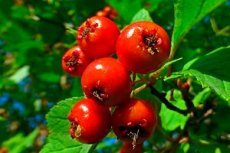Medical expert of the article
New publications
Hawthorn for diabetes mellitus
Last reviewed: 04.07.2025

All iLive content is medically reviewed or fact checked to ensure as much factual accuracy as possible.
We have strict sourcing guidelines and only link to reputable media sites, academic research institutions and, whenever possible, medically peer reviewed studies. Note that the numbers in parentheses ([1], [2], etc.) are clickable links to these studies.
If you feel that any of our content is inaccurate, out-of-date, or otherwise questionable, please select it and press Ctrl + Enter.

Hawthorn is another very vitamin-rich berry.
Hawthorn can be consumed fresh, dried and frozen. From the scarlet fruits you can prepare teas, infusions, decoctions, alcohol tinctures, which help saturate the body with useful substances and control blood sugar levels. But still, you should not abuse this useful berry.
Benefits
Its vitamin composition is similar to currants. In addition, the berry contains more than 15 microelements, including potassium, magnesium, calcium, iron, copper, zinc, and iodine. Due to the high content of potassium and glycosides, hawthorn has a positive effect on the cardiovascular system suffering from diabetes. This same berry can be considered a rich source of calcium, which diabetics lose in large quantities every day.
Hawthorn, like many other berries, contains flavonoids that prevent the formation of atherosclerotic plaques, strengthen blood vessels and help maintain youth. Pectin in the berries helps normalize metabolic processes in the body and has an anti-inflammatory effect in wound processes due to diabetes. Multiple organic acids maintain acid-base balance and improve the functioning of the digestive organs, in particular the intestines and pancreas. A rare component, choline, nourishes the brain and prevents the development of obesity, which often occurs with diabetes.
 [ 7 ]
[ 7 ]
Contraindications
These berries are incredibly useful for people with cardiovascular pathologies, but they require some caution in use. For example, in a post-stroke condition, with bradycardia and low blood pressure, it is better to refuse to take berries. And with other diseases of the heart and blood vessels, you should simply not abuse the fruits, limiting yourself to 1 glass per day, which is the norm for diabetes. Abuse of berries can also lead to kidney failure.
Although the scarlet berries of hawthorn do not have a sour taste, they can stimulate the production and secretion of bile, which is dangerous in acute gastrointestinal pathologies. Eating the fruit on an empty stomach can provoke a spasm of the blood vessels and muscles of the organ, a vomiting reaction, and if you wash down the fruit with cold water after eating it, there is a risk of painful intestinal colic.
Hawthorn has a pronounced sedative effect, due to which it is able to stabilize the state of the central nervous system and improve sleep. But this property may be unsafe for people whose activities require high concentration. There will be no harm from eating a small handful of berries, but drowsiness may appear from a glass or more.
Pregnant women and nursing mothers are allowed only light infusions and teas from the plant's fruits.
 [ 8 ]
[ 8 ]

